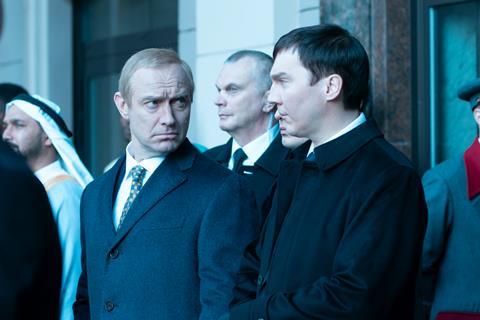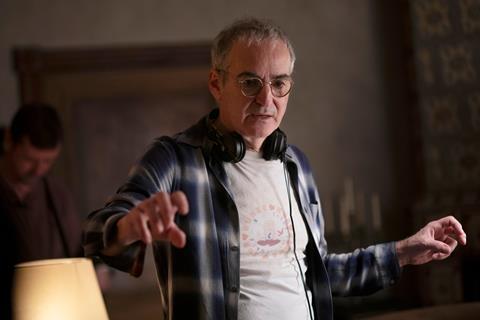French filmmaker Olivier Assayas’ thriller The Wizard Of The Kremlin tackles the power plays behind the rise of Vladimir Putin. “I had the impression every day that I was going to war,” he tells Screen.

French filmmaker Olivier Assayas’ political thriller The Wizard Of The Kremlin centres on the life of Vadim Baranov, an imagined advisor and chief media manipulator behind Vladimir Putin’s rise to power. The film is based on Giuliano da Empoli’s 2022 speculative historical novel of the same name, and follows the character — based on real-life Putin adviser Vladislav Surkov — over more than a decade, as the Kremlin insider blurs truth with lies and news with propaganda, from the collapse of the USSR in the early 1990s and throughout Putin’s political career.
Paul Dano and Jude Law star as Baranov and a young Putin respectively, while Jeffrey Wright plays the journalist to whom Baranov recounts his life story. “It’s not a film about Putin and his rise to power,” insists Assayas. “It’s a thriller that raises questions about contemporary politics. It’s about the new modalities of power and the people who have — and continue to — reinvent politics for our modern era. While making this film I felt I was telling the story of the seed that was planted and has grown into the political world in which we live today.”
The Wizard Of The Kremlin screens in Special Presentations at TIFF following its world premiere in competition at Venice. The ambitious $20m feature is produced by Olivier Delbosc for his Curiosa Films and Sidonie Dumas, CEO of French studio Gaumont, which also handles international sales.
Assayas first came across the novel when da Empoli sent him a copy ahead of publication, but the filmmaker was initially reticent about adapting it for the big screen. “It is very dialogue-heavy and quite abstract,” he says.
But when Assayas showed the book to his friend Emmanuel Carrere, who is also an author and filmmaker, the latter was more enthusiastic about its screen potential. The pair set about the challenge of adapting it.
The film diverges from the novel in several ways, including fleshing out the main female character, Baronov’s love interest Ksenia (played by Alicia Vikander). “It brings a romantic angle that gives the story more oxygen and becomes a driving force in the narrative,” says Assayas. The writers also added a gut-punch finale that is different from the book.
Assembling the cast

At $20m, attracting an A-list cast was a prerequisite to get the film made. Assayas first approached Vikander, who he had directed in 2022 HBO miniseries Irma Vep. “She was the natural choice,” he says. “I essentially wrote the part for her.”
After that came Dano — “the actor I felt would best represent Baranov’s humanity and also his perversity” — and Law, with whom Assayas had served on the Cannes Film Festival jury in 2011. “I knew he would be able to portray Putin from the inside,” says Assayas of the UK actor, who does not bear a strong physical resemblance to the Russian leader, with the actors mainly using their own accents rather than attempting to sound ‘Russian’.
The film is in the English language. “It was a complex question and a big decision from the beginning,” says Assayas. “In an ideal world, I would have filmed it in Russian, but I made the choice early on not to impose unified accents and give the actors the most freedom possible. I preferred that they focus more on their emotions and authenticity than their accents.”
Even with such a strong cast, raising the financing was complicated. “For months we were living in terror that the film wouldn’t be made,” admits Assayas. “As soon as you set out to make an ambitious film not for teenage audiences today, it’s tough.”
Gaumont came on board early, followed by France 2 Cinéma as a co-producer. Along with pre-sales for broadcast rights to France Télévisions, Canal+ and Disney, and the French tax credit, Gaumont was able to fill the finance gap through private equity investors in the US.
The film shot over 42 days between December 2024 and February 2025 in Latvia, working with local service producers Forma Pro Films (which also handled production on Kristen Stewart’s debut The Chronology Of Water). Assayas and his crew were able to recreate scenes set in Moscow, Saint Petersburg, the Black Sea and even the Grand Kremlin Palace, reconstructed in a 17th-century castle in southwest Latvia, before production moved to the south of France for three days. The film juxtaposes real archival footage from key historical moments with fabricated footage using actors and special effects.
High stakes
Assayas describes every day of the shoot as a challenge. “There are films that are difficult to make, and other films that are extremely difficult to make — and this was the latter,” he says. “Every day I woke up, I said, ‘How will we ever film this?’ I had this impression every day that I was going to war.”
He adds: “When you make an ambitious film like The Wizard Of The Kremlin, there is no room for error. So many people put their trust in this project, so everything had to live up to expectations.”
Assayas took great liberties with the fictional aspects of the original book, so he says the film’s political details needed to be historically accurate: “That is where there is room for the film to be attacked, so I made sure we are credible.”
To maintain such strict verisimilitude, da Empoli served as a resource throughout the adaptation process — “We were in constant dialogue” — while Carrere, who has written books on Russia (A Russian Novel and Limonov, adapted by Kirill Serebrennikov for his feature Limonov: The Ballad) and has roots in the region, was key in that regard. Assayas also met with several Russia-born former political journalists based in Latvia who had crossed paths with many of the real-life figures in the film, describing them as “invaluable sources”.
Assayas, whose prolific filmmaking career includes the 1996 feature version of Irma Vep and 2016’s Personal Shopper starring Kristen Stewart, and whose most recent feature Suspended Time was released in the US in August by Music Box Films, says he will continue to look beyond French borders in his career.
“The only way to be free today in cinema is to be able to make international films with European budgets,” he says. “As for making local films in a French industry often closed in on itself, I’ve done that. Today, what I want to do is reach out to the world and make films with a universality in not only the stories they tell, but also through their actors. The way we communicate with international audiences is with well-known casts and it is essential to respect the rules of the game to try to break out from the French cinema box.”
Still in early development, Assayas confirms the script is written for his next project. Delbosc is on board to produce, and it will shoot in the English language with “a well-known American or international cast”. In the meantime, he will be joining The Wizard Of The Kremlin’s festival tour (after TIFF it goes to Busan and San Sebastian) ahead of a January 2026 release in France through Gaumont.
Despite a feverish political climate, Assayas insists he is not concerned about reactions — even from the president in the Kremlin, who da Empoli told the producers is aware of the film’s existence. “I don’t know if Putin will see it,” says Assayas. “I don’t think he has time to sit down and watch a French film, although I think it would amuse him to be played by Jude Law.”















![[L-R]: Amanda Villavieja, Laia Casanovas, Yasmina Praderas](https://d1nslcd7m2225b.cloudfront.net/Pictures/274x183/6/4/1/1471641_pxl_20251224_103354743_618426_crop.jpg)



![[L-R]: Amanda Villavieja, Laia Casanovas, Yasmina Praderas](https://d1nslcd7m2225b.cloudfront.net/Pictures/100x67/6/4/1/1471641_pxl_20251224_103354743_618426_crop.jpg)


No comments yet